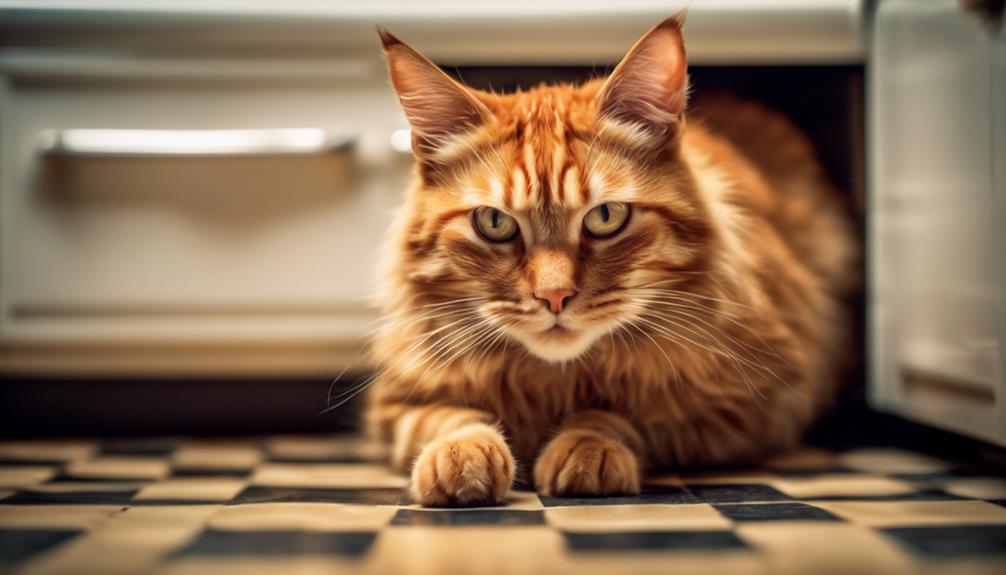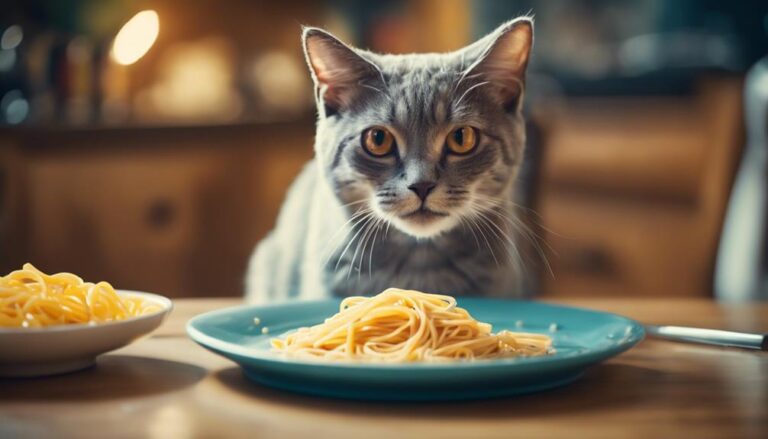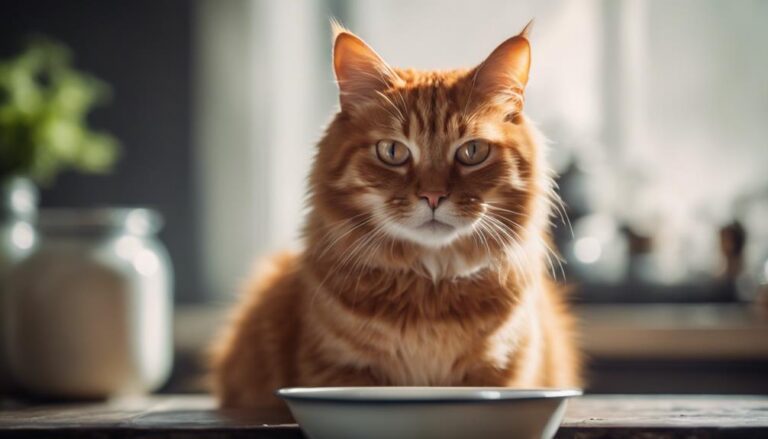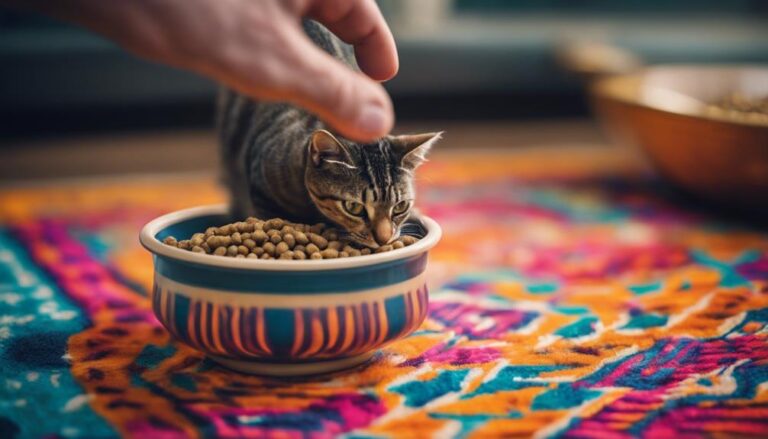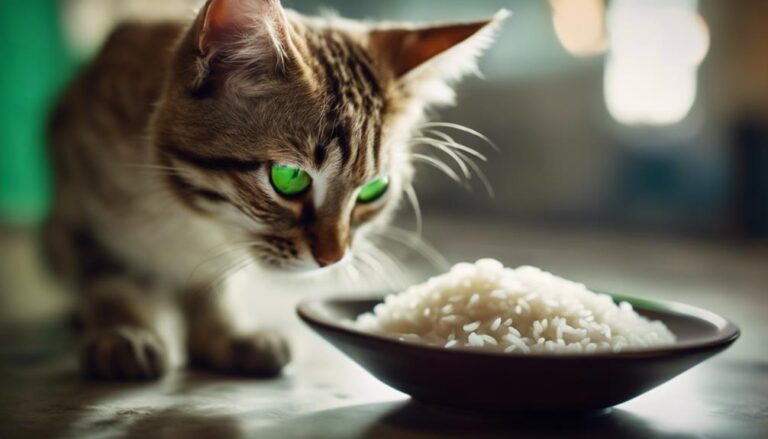If you've ever wondered about whether cats can eat chicken, the answer might surprise you. While it's generally safe for felines to consume chicken, there's a catch. Consider this – what about the seasoning or preparation methods? And what if your cat has specific dietary needs? Before you make a decision, it's crucial to understand the nuances involved in feeding chicken to your furry friend. So, are you ready to explore the ins and outs of this popular protein choice for cats?
Health Benefits of Chicken
Chicken offers cats essential nutrients like selenium, vitamin B6, and phosphorus, promoting overall health and well-being. Cats require a diet rich in protein to meet their nutritional needs, making chicken a fantastic choice due to its high protein content. As a lean protein source, chicken supports weight management and muscle development in felines. Additionally, being low in sodium and fat, chicken helps maintain healthy bones and teeth in cats.
The nutrients found in chicken are essential for your cat's overall health, making it a valuable addition to their diet. By incorporating chicken into your cat's meals, you're providing them with a delicious and nutritious source of sustenance that supports their well-being. Make sure to include chicken as part of a balanced diet to ensure your feline friend receives the necessary nutrients to thrive.
Potential Risks of Feeding Chicken
When considering feeding your feline friend chicken, it's important to be aware of potential risks.
Chicken bones can be hazardous, raw meat poses dangers like Salmonella, and seasoning or spices may not agree with your cat's digestive system.
Stay cautious and ensure any chicken offered to your cat is cooked thoroughly to minimize these risks.
Chicken Bones Hazards
Feeding your cat chicken bones can pose significant risks to their health and well-being. Chicken bones present a choking hazard and can get stuck in the throat or digestive tract, potentially leading to serious health issues like punctures.
These bones are included in the ASPCA toxic food list for cats due to the dangers they carry. To safeguard your cat's safety, it's crucial to steer clear of feeding them chicken bones. Opt for boneless cooked chicken as a safer alternative protein source.
Ensuring that your cat's meals are bone-free is essential in preventing any harm or injuries that could arise from the consumption of chicken bones.
Raw Meat Dangers
Consuming raw meat, particularly chicken, poses significant health risks for your feline companion. Raw chicken carries the potential of Salmonella and E. coli contamination, which can lead to severe infections in cats. These pathogens not only affect cats but can also pose health risks to humans if mishandled.
Feeding raw chicken to your cat increases the chances of foodborne illnesses and digestive issues. Moreover, the bones in raw chicken can splinter, causing choking hazards or digestive tract injuries in cats.
To mitigate these risks, it's advisable to cook chicken thoroughly before offering it to your feline friend. Cooking the chicken eliminates the potential health hazards associated with raw meat, ensuring the safety of your beloved pet.
Seasoning and Spices
Be cautious when preparing chicken for your cat as seasoning and spices can be harmful to their sensitive digestive systems. Cats are particularly vulnerable to ingredients like garlic, onions, and salt, commonly found in seasoned chicken, as these can be toxic to them.
The presence of spices and seasonings in the food can lead to gastrointestinal upset, anemia, and potentially even organ damage in cats. To ensure the health and well-being of your feline companion, it's crucial to only feed them plain, cooked chicken without any added seasonings or spices.
Remember that sharing seasoned chicken with your cat can pose significant risks and it's best to err on the side of caution when it comes to their food choices.
Safe Practices for Feeding Chicken
When feeding chicken to your cat, remember to:
- Remove bones and cartilage
- Skip the skin
- Keep it plain without seasonings
Be mindful of portion sizes and stick to cuts that are safe for your feline friend. Practice safe cooking methods to ensure your cat enjoys their chicken safely.
Chicken Preparation Tips
How can you ensure that the chicken you feed your cat is prepared safely to avoid any potential health risks?
When feeding cats chicken, opt for cooked chicken breast without any seasoning or oils, as this is safe for cats and rich in protein beneficial for their immune system. Avoid raw chicken, which can harbor harmful pathogens such as Salmonella. Refrain from sharing chicken parts with bones or cartilage to prevent choking hazards. Additionally, skip feeding cats chicken skin due to its high-fat content and chewiness.
Remember that treats, including chicken, should only constitute a small portion of your cat's daily food intake, making up less than 10% to maintain a balanced diet and prevent any digestive issues.
Portion Control Guidelines
To ensure your cat's health and well-being, limit the amount of chicken served to them daily to less than 10% of their total intake. When feeding chicken to your cat, follow these portion control guidelines:
- Stick to Plain Chicken: Cats should be fed plain chicken without any oils, seasonings, or spices.
- Choose Boneless Chicken: Opt for boneless chicken cuts to prevent any choking hazards.
- Select Skinless Chicken: Avoid feeding cats chicken with skin due to its high-fat content and difficulty to chew.
- Less than 10% Daily Intake: Remember that treats or table scraps, including chicken, should make up less than 10% of your cat's daily diet.
Following these guidelines will help ensure your cat enjoys chicken safely and in moderation.
Cooking Methods for Cats
To ensure your cat's safety and health, always cook chicken for them using plain cuts without added oils or seasonings. When preparing chicken for your feline friend, opt for safe cuts that are easy to digest and free of bones, cartilage, and skin.
Avoid feeding your cat chicken skin due to its high-fat content and potential difficulty in chewing. Remember that treats like chicken should make up less than 10% of your cat's daily intake to maintain a balanced diet.
Choose cooking methods that involve simple preparation, such as boiling or baking, to ensure the chicken remains plain and suitable for your cat's consumption. By following these guidelines, you can provide your cat with a safe and enjoyable chicken-eating experience.
Incorporating Chicken in Cat's Diet
Incorporating chicken into your cat's diet can provide essential protein for their muscle and bone health. Here are some important points to consider:
- Choose Cooked Chicken: Opt for plain, cooked chicken breast without skin or bones to ensure it's a safe option for your feline friend's diet.
- Nutrient-Rich Option: Chicken offers vital nutrients like arginine and vitamin D, contributing to your cat's overall well-being.
- Limit Treats: Treats or table scraps should constitute less than 10% of your cat's daily food intake to maintain a balanced diet.
- Avoid Chicken Skin: It's advisable to avoid feeding your cat chicken skin due to its high-fat content and potential digestion issues.
Alternative Protein Sources for Cats
Consider incorporating alternative protein sources in your cat's diet to provide variety and essential nutrients for their well-being. Tuna, salmon, and turkey are excellent alternatives to chicken, offering a diverse range of flavors and textures that can keep your feline friend interested in mealtime.
Eggs, along with dairy products like cheese and yogurt, also serve as valuable protein sources for cats. If you're looking to explore plant-based options, tofu and lentils can be included in your cat's diet to supplement their protein intake.
Additionally, commercial cat foods containing proteins from sources such as duck and venison are readily available in the market. Remember, consulting a veterinarian for guidance on incorporating these alternative protein sources into your cat's diet is highly recommended to ensure they receive a balanced and nutritious meal plan tailored to their specific needs.
Conclusion: Can Cats Consume Chicken
When determining whether cats can consume chicken, it's crucial to consider the protein content and potential dietary benefits for your feline companion. Here are some key points to keep in mind:
- Nutritious Protein Source: Chicken is an excellent source of animal protein, which is essential for cats' muscle development and overall health.
- Feeding Recommendations: Offering plain cooked chicken breast without skin or bones is a safe option for incorporating chicken into your cat's diet.
- Balanced Diet Inclusion: Chicken should be a part of a well-rounded and complete feline diet to ensure your cat receives all the necessary nutrients.
- Moderation is Key: While cats can enjoy cooked chicken, including it as treats or table scraps should be limited to no more than 10% of their daily food intake to prevent nutritional deficiencies.
Frequently Asked Questions
Is It OK to Give Cats Cooked Chicken?
Giving your cat cooked chicken is safe and healthy when served plain without bones or seasoning. It's a great protein source that can be a tasty treat in moderation. Remember to consult your vet for advice on including chicken in your cat's diet.
Is It OK to Feed Cats Raw Chicken?
Avoid feeding cats raw chicken. It can harbor harmful bacteria and parasites, posing health risks. Cook chicken thoroughly before offering it to your feline friend. Keep your cat safe and healthy by avoiding raw chicken.
Why Can't Cats Have Rotisserie Chicken?
Avoid feeding cats rotisserie chicken due to harmful spices and tough meat causing digestive issues. Its high fat and salt content can harm feline health. Opt for plain cooked chicken breast without seasoning for a safer choice.
How Much Chicken Can I Give My Cat?
You can give your cat cooked chicken in moderation. Limit chicken to 10% of their daily calories to prevent nutritional issues. Consult your vet for advice on feeding chicken to ensure a balanced diet.

